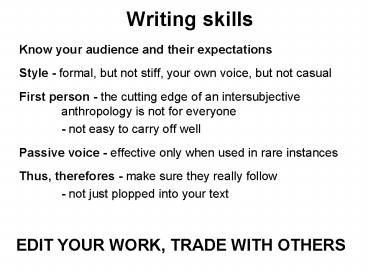Writing skills - PowerPoint PPT Presentation
1 / 16
Title:
Writing skills
Description:
First person - the cutting edge of an intersubjective anthropology is ... not easy to carry off well. Passive voice - effective only when used in rare instances ... – PowerPoint PPT presentation
Number of Views:37
Avg rating:3.0/5.0
Title: Writing skills
1
Writing skills
- Know your audience and their expectations
- Style - formal, but not stiff, your own voice,
but not casual - First person - the cutting edge of an
intersubjective anthropology is not for everyone - - not easy to carry off well
- Passive voice - effective only when used in rare
instances - Thus, therefores - make sure they really follow
- - not just plopped into your text
EDIT YOUR WORK, TRADE WITH OTHERS
2
Disadvantages of structuralism
- Static
- Saussures diachronic is a succession of
synchronic slices - Over-coherence of the system
- Sapir, all grammars leak
- Emphasizes rules over creativity
- Problem of agency
3
Symbolic anthropology, structuralism,
colonialism, modernity, traditiontake your old
-ism and add post-
Post-modernism,Post-structuralism,post-coloniali
sm, post-socialism
4
Postmodern critique
- Technologies of power in representations
- No innocent encounters or writings
- Regimes of truth
- (Derrida, Foucault, Latour, Clifford, Marcus,
Fisher, Tyler) - Dont sweat the names, stick to the ideas this
week
5
On ethnographic authority
- James Clifford
- Ethnography is enmeshed in writing from start to
finish - A translation of experience into texts
- You are there because I was there
6
Ethnographic authority
- Malinowski, Radcliffe-Brown, Boas, Mead
established professional fieldwork as basis for
ethnography and scientific authority - Malinowski worked to show that he had objectively
acquired facts, not subjective creations
7
New style of representation
- Persona of fieldworker validated publicly and
professionally - Ethnographer could efficiently use native
languages with little direct experience, at most
two years - Increased emphasis on the power of observation
- Certain powerful theoretical abstractions help
professional ethnographers get to the core of a
culture, unlike amateurs documenting a random
inventory of customs - Professional ethnographer focused thematically on
particular institutions - Wholes represented were synchronic. Ethnographic
present indicated this snapshot form a short
timespan
8
Experience and interpretation
- Verstehen (understanding)
- Results from coexistence in a shared world
- Intersubjective ground for objective forms of
knowledge - Experience is the building up of a common,
meaningful world - Fables of rapport
- Geertzs tale of the Balinese cockfight
- Provide foundation for ethnographic authority-
- I was initiated.
9
Edward Said, Orientalism
The West defines itself in opposition to a
romantic other Images of the oriental - exotic,
dangerous, feminine, distant, subordinate,
wild The place of Europes oldest colonies
10
Edward Said, Orientalism
How does one represent other cultures? What is
another culture? Is the notion of a distinct
culture (or race, or religion, or civilization) a
useful one, or does it always get involved either
in self-congratulation (when one discusses ones
own) or hostility and aggression (when one
discusses the other)? But what about these
others? Do they just take it lying down?
11
Johannes Fabian, Time and the Other
- Coevalness - being in the same time,
contemporaneous - 19th century travel - from centers of
civilization to peripheries was analogous to
travels back in time - Descriptions of exotic, primitive people was akin
to writing a Universal History of Man - Dispersal in space reflects direct sequence in
time - Geology, archeology (seriation), astronomy,
ethnology
12
Johannes Fabian, Time and the Other
- A discourse employing terms such as primitive,
savage (but also traditional, Third World, or
whatever euphemism is current) does not think, or
observe, or critically study the primitive it
thinks, observes, studies in terms of the
primitive. Primitive being essentially a temporal
concept, is a category, not an object, of Western
thought. - The ethnographic present is a key aspect of the
denial of coevalness - Coevalness is a mode of temporal relations. It
must be actively created.
13
The reflexive turn
- Post-modern critique is a frontal attack on
ethnography - Naïve representations of an imagined Other
- Implicit denial of coevalness due to lack of
awareness - False objectivity through lack of attention to
perspective - Critical attention to activity of ethnography and
more active interest in the history of
anthropology
14
Role of theory in po-mo
- Theory as toolkit
- Not a system but an instrument, a logic of the
specificity of power relations and the struggles
around them - Investigation must be conducted on the basis of
reflection on given situations - Necessity of history, historical reflection
15
Writing culture
- Calls for a more discursive model of ethnography
- Highlight the intersubjectivity of speech and
social life - Immediacy of performance and interaction
- Who is the author of fieldnotes?
- As we write down what other people say and do,
are we plagiarizing their lives? - Indigenous control over production of
ethnographic knowledge is subtle and
considerable. - Move to more co-authors on title pages?
- Return to Boasian native vernacular texts?
- Heteroglossia
16
Postmodern ethnographies
- Coherent presentation presupposes a controlling
mode of authority. - Avoid totalizing narratives of homogenous,
coherent wholes - Experiential, interpretive, dialogical, and
polyphonic processes are at work, discordantly,
in any ethnography - Good, vibrant ethnographic writing is struggling
within and against these possibilities.































